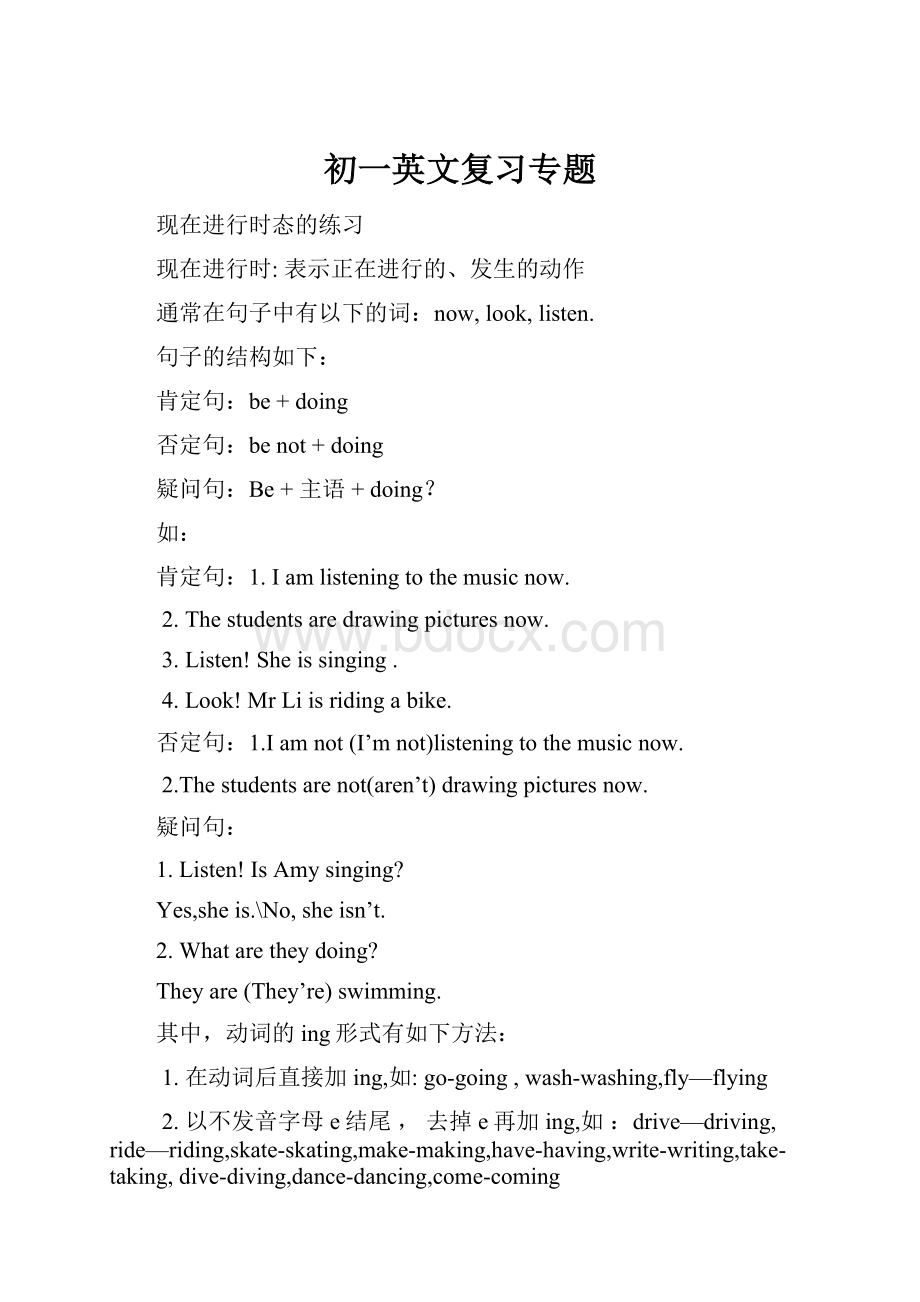初一英文复习专题.docx
《初一英文复习专题.docx》由会员分享,可在线阅读,更多相关《初一英文复习专题.docx(17页珍藏版)》请在冰豆网上搜索。

初一英文复习专题
现在进行时态的练习
现在进行时:
表示正在进行的、发生的动作
通常在句子中有以下的词:
now,look,listen.
句子的结构如下:
肯定句:
be+doing
否定句:
benot+doing
疑问句:
Be+主语+doing?
如:
肯定句:
1.Iamlisteningtothemusicnow.
2.Thestudentsaredrawingpicturesnow.
3.Listen!
Sheissinging.
4.Look!
MrLiisridingabike.
否定句:
1.Iamnot(I’mnot)listeningtothemusicnow.
2.Thestudentsarenot(aren’t)drawingpicturesnow.
疑问句:
1.Listen!
IsAmysinging?
Yes,sheis.\No,sheisn’t.
2.Whataretheydoing?
Theyare(They’re)swimming.
其中,动词的ing形式有如下方法:
1.在动词后直接加ing,如:
go-going,wash-washing,fly—flying
2.以不发音字母e结尾,去掉e再加ing,如:
drive—driving,ride—riding,skate-skating,make-making,have-having,write-writing,take-taking,dive-diving,dance-dancing,come-coming
3.双写双写末尾字母,再加ing,如:
swim-swimming,run—running,get—getting,put-putting,set-setting
练习:
1.MrZheng_____________(read)abooknow.
2.Therabbits_____________(jump)now.
3..Look!
TomandJohn_____________(swim).
4.Mybrother_____________(make)akiteinhisroomnow.
5.Look!
Thebus_____________(stop).
6.We_____________(have)anEnglishclassnow.
7.Listen!
Someoneis_____________(come).
8.Whataretheydoing?
They_________________(catch)butterfliesnow.
9.Whatishedoing?
He_____________(do)anexperimentnow.
10.Aretheycollegtingleaves?
No,they’renot.They_______________(collect)stampsnow.
11.Look!
He_____________(dive)now.
12.Tom_______________(watch)TVinthediningroom.
13.Thedoctors_____________(get)offthebus.
14.Comeon.They_____________(leave)now.
15.It_____________(eat)fishnow.
16.Myfather_______________(work)intheofficenow.
17.Whereisyourmother?
She_______________(answer)thephone.
18.Theteachers_____________(run)now.
一般将来时讲解与练习
一、概念:
表示将要发生的动作或存在的状态
句中一般有以下时间状语:
tonight,inthefuture,tomorrow,nextday(week,month,year…),soon,thedayaftertomorrow(后天),in+段时间(在...之后)等。
二、基本结构:
①主语+begoingto+do;②主语+will+do.③主语(只能为I/We)+shall+do
三、否定句:
在①be动词(am,is,are)后加not;②will后加not成won’t;③shall后加not成shan’t
例如:
I’mgoingtohaveapicnicthisafternoon.→I’mnotgoingtohaveapicnicthisafternoon.
四、一般疑问句:
be或will或shall提到句首,some改为any,and改为or,第一二人称互换。
例如:
Wearegoingtogoforawalkthisweekend.
→Areyougoingtogoforawalkthisweekend?
五、对划线部分提问。
一般情况,一般将来时的对划线部分有三种情况。
1.问人。
Who例如:
I’mgoingtoNewYorksoon.→Who’sgoingtoNewYorksoon.
2.问干什么。
What…do.
例如:
Myfatherisgoingtowatchamatchwithmethisafternoon.
→Whatisyourfathergoingtodowithyouthisafternoon?
3.问什么时候。
When.例如:
She’sgoingtogotobedatnine.→Whenisshegoingtobed?
六、同义句:
begoingto=will
Iamgoingtogoswimmingtomorrow.=Iwillgoswimmingtomorrow.
七、begoingto和will的区别
begoingto和will的用法虽然都表示将来发生动作或情况,但它们的用法是有区别的。
(1)begoingto主要用于:
1、表示事先经过考虑、安排好打算、计划要做的事情。
E.g.
Whatareyougoingtodotoday?
今天你们打算做什么?
DadandIaregoingtowatchanoperathisafternoon.今天下午我和爸爸打算去看歌剧。
I’mgoingtoplaytheviolin.我打算拉小提琴。
She’sgoingtoplaythepiano.她打算弹钢琴。
2、表示根据目前某种迹象判断,某事非常有可能发生。
E.g.
Look!
Therecomethedarkclouds.Itisgoingtorain.瞧!
乌云密集,天要下雨。
IamafraidIamgoingtohaveacold.恐怕我要患重感冒。
(2)will主要用于在以下几个方面:
1、表示单纯的未来“将要”通用各个人称。
eg:
Theywillgotovisitthefactorytomorrow.明天他们将去工厂参观。
I’llcomewithWangBing,LiuTaoandYangLing.我将和王兵、刘涛、杨玲一起来。
2、表示不以人的意志为转移的自然发展的未来的事。
eg:
TodayisSaturday.TomorrowwillbeSunday.今天是星期六。
明天是(将)是星期日。
Hewillbethirtyyearsoldthistimenextyear.明年这个时候他就(将)三十岁。
3、问对方是否愿意做某事或表示客气地邀请或命令。
eg:
Willyoupleaseturnontheradio?
请打开收音机好吗?
Willyougotothezoowithme?
你和我一起去动物园好吗?
八、一般将来是特殊用法:
1)be+不定式表将来,按计划或正式安排将发生的事。
WearetotalkaboutthereportnextSaturday.
2)beaboutto+不定式,意为马上做某事。
HeisabouttoleaveforBeijing.
注意:
beaboutto不能与tomorrow,nextweek等表示明确将来时的时间状语连用。
3)有些表趋向性的动词可用想在进行时表将来:
例如:
go,come,arrive,fly(飞往),reach(到达),stay,leave,start,die...
如:
I’mgoingtogotothezoothisweenend.=I’mgoingtothezoothisweenend.
He’sgoingtoleaveforParis.=He’sleavingforParis.
Theoldmanisdying.=Theoldmanwilldie.这个老人要去世。
4)要注意“主将从现”这一语法现象:
重要连词有:
if(如果),assoonas(一....就...),when(当...时候),before,after,until(直到not..until直到...才),unless(=not...if除非)...
Ifitrains,wewon’thaveapicnicnextweek.
I’lltellyouthenewsassoonasyoucomeback.
练习:
一、填空。
1.我打算明天和朋友去野炊。
I________________________haveapicnicwithmyfriends.
2.下个星期一你打算去干嘛?
我想去打篮球。
What___________________________________________nextMonday?
I______________________playbasketball.
3.你妈妈这个周末去购物吗?
是,她要去买一些水果。
________yourmother_______________goshoppingthis___________?
Yes,she_________.She________________________buysomefruit.
4.你们打算什么时候见面?
Whattime_______you___________________meet?
二、改句子。
5.Nancyisgoingtogocamping.(改否定)Nancy________goingtogocamping.
6.I’llgoandjointhem.(改否定)I_______go______jointhem.
7.I’mgoingtogetupat6:
30tomorrow.(改一般疑问句)
_______________________togetupat6:
30tomorrow?
8.Wewillmeetatthebusstopat10:
30.(改一般疑问句)
_______________meetatthebusstopat10:
30?
9.Sheisgoingtolistentomusicafterschool.(对划线部分提问)
_______________she_________________________afterschool?
10.Myfatherandmotheraregoingtoseeaplaythedayaftertomorrow.(同上)
__________________goingtoseeaplaythedayaftertomorrow?
三、用所给词的适当形式填空。
11.Todayisasunnyday.We__________(have)apicnicthisafternoon.
12.Mybrother_______________(go)toShanghainextweek.
13.Tomoften____________(go)toschoolonfoot.Buttodayisraining,he______________(go)toschoolbybike.
14.Whatdoyouusuallydoatweekends?
Iusually__________(watch)TVand__________(catch)insects?
15.It’sFridaytoday.What________she_________(do)thisweekend?
She_________(watch)TVand_________(catch)insects(害虫).
16.What___________(do)youdoonSundays?
I____________(pick)applesonafarm.
What______________(do)nextSunday?
I______________(milk)cows.
17.Mary____________(visit)hergrandparentstomorrow.
18.LiuTao____________(fly)kitesintheplaygroundafterschooleveryFriday.
19.David______________(give)apaintingshownextMonday.
20.I________________(plan)formystudynow.
21.We___________(buy)himapenforhisbirthdaynextweek.
22.I____________(call)youwhenIgetthere.
23.________I_______(begin)toplaycomputergames?
24.Ifit______(be)sunnytomorrow,we__________(have)apicnicoutside.
25.I___________(tell)himthenewswhenIseehimattheoffice.
26.There_______________(notbe)afootballmatchnextmonth.
27.---_________he_________(give)atalkon“Worksofart”nextFriday?
---No,he_______.He______(visit)thePalaceMuseum.
28.Where______Tom_________(go)thedayaftertomorrow?
29.She________(notgo)swimmingthisweekend.
30.She_________(watch)TVeveryevening.Butshe__________(notwatch)TVtonight.
四、单项选择:
1.Mother________meanicepresentonmynextbirthday.
A.willgivesB.willgiveC.givesD.give
2.He________herabeautifulhatonhernextbirthday.
A.givesB.gaveC.willgiveD.isgoinggiving
3.He__inthreedays.A.comingbackB.camebackC.willcomebackD.isgoingtocomingback
4.Who________________swimmingwithustomorrowafternoon?
A.will;goB.do;goC.will;goingD.shall;goes
5.Thedayaftertomorrowthey________avolleyballmatch.
A.willwatchB.watchesC.iswatchingD.towatch
6.They________anEnglisheveningnextSunday.
A.arehavingB.aregoingtohaveC.willhavingD.isgoingtohave
7.________you________freenextSunday?
A.Will;areB.Will;beC.Do;beD.Are;be
8.He________thereattentomorrowmorning.A.willB.isC.willbeD.be
9.I_________ateacherinthefuture.A.will,beB.is,beC.is,beingD.will,is
10.They_________totheparknextSunday.A.willgoesB.willgoC.isgoingD.willgo
11.Myfamily_________tochurchnextweekend.A.willgoB.goesC.willgoingD.isgoing
12.Mymotherwill____meapenciltonight.A.givesB.givingC.give
13.He______playfootballtomorrow.A.willB.isC.be
14.Mygrandpaandgrandma____toseeusintwodays.
A.willcomingB.willcomeC.iscomingD.arecoming
15.She_______TVthisevening.A.willswatchB.willwatchingC.iswatchingD.willwatch
16.Mygrandpa_________athomethedayaftertomorrow.
A.willstayB.willsstayC.willstaysD.isstaying
17.Momwill_____backsoon.A.comesB.comingC.comesD.Come
一、巧记一般过去时:
动词一般过去时,表示过去发生的事;be用was或用were,have,has变had;
谓语动词过去式,过去时间作标志;一般动词加-ed,若是特殊得硬记。
否定句很简单,主语之后didn’t添;
疑问句也不难,did放在主语前;不含be动词时
如果谓语之前有did,谓语动词需还原;
动词若是was,were,否定就把not添。
含be动词时
疑问句也不难,要把was,were放在主语前。
二、be的一般过去时:
学习动词be的一般过去时,下面有一口诀,它可以帮你们更好地掌
握动词be的一般过去时。
be的过去时有四巧:
一是时间状语巧,表示过去的短语要记牢;
二是形式巧,单数was,复数were;
三巧是否定句结构,not紧跟was/were;
四是疑问句式巧,was/were向前跑(提前)。
【一巧】时间状语(即标志词)巧。
一般过去时表示过去发生的动作或存在的状态,恰巧
与表示过去的一些时间状语连用。
【二巧】形式巧。
它与一般现在时一样,形式多样:
当主语是第一人称单数或第三人称单
数时,谓语动词用was;主语是第二人称或其他人称复数时,谓语动词用were。
例如:
Iwasintheclassroomyesterdaymorning.昨天早上我在教室里。
HewasatschoollastTuesday.上周二他在学校。
Theywereoverthereamomentago.刚才他们在那边。
【三巧】否定句结构巧。
与动词be的一般现在时一样,它在动词后面加not即可变成否定
句,并且was,were与not可以缩写成wasn't,weren't。
即:
主语+wasn't/weren't+表语+其他。
例如:
Iwasnot(=wasn't)hereyesterday.昨天我不在这儿。
Myparentswerenot(=weren't)athomelastSunday.上周日我父母不在家。
【四巧】疑问句式巧。
把was,were提到句首,句末用问号即可变为一般疑问句。
即:
Was(Were)+主语+表语+其他?
这恰巧与动词be的一般现在时的疑问句
式相似。
例如:
Wereyouathomethedaybeforeyesterday﹖前天你在家吗?
Wasshelatethismorning﹖今天早上她迟到了吗?
更巧的是疑问句的答语也相似,肯定回答用“Yes,主语+was/were.”;
否定回答用“No,主语+wasn't/weren't.”。
例如:
—WereWeiHuaandHanMeiherejustnow﹖刚才魏华和韩梅在这儿吗?
—Yes,theywere.(No,t